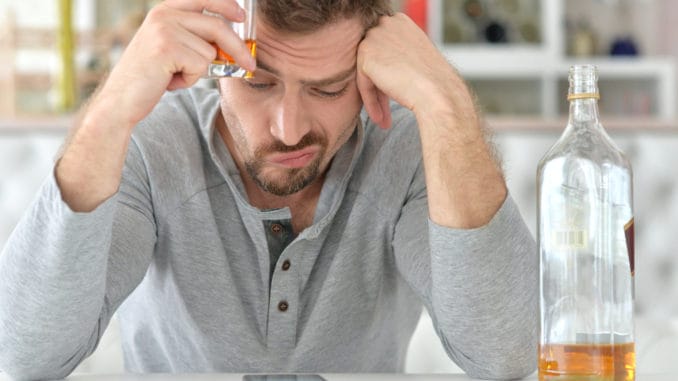
[cmamad id=”27170″ align=”center” tabid=”display-desktop” mobid=”display-desktop” stg=””]
What they aren’t telling you about drinking and serotonin…
—-Important Message From Our Sponsor—-
Get this Tactical Backpack for FREE – if you hurry
Patriot, I need your help…
We literally have 2 x 40 foot shipping containers FULL of these tactical assault backpacks…
So, we are giving them away for FREE!
This is NOT a joke… And yes, we’re going to lose money here.
These backpacks retail for $79.95… However, we are overstocked… So you can get one for free!
Click here to claim your 7-piece survival grab bag now before they’re gone!
———-
Brain serotonin is very bad – alcohol to the rescue?
Serotonin and ethanol – that is a controversial topic.
There have been many trees killed, much ink used, and endless academic squabbles over just how ethanol affects serotonin.
Recently, this topic has gained a wider audience thanks to Jordan Peterson…
While not exactly a biochemist, he is a clinical psychologist and public figure.
“Studies of the effects of acute ethanol administration on serotonin activity in healthy, non-alcohol-abusing, non-alcoholic volunteers have produced results too contradictory to summarize here.” –Peterson
This topic is extremely controversial…
So controversial that researchers can hardly agree whether or not alcohol actually increases or decreases total brain serotonin levels.
But this “paradoxical effect” of ethanol on serotonin metabolism/kinetics is a misconception.
Exactly how ethanol intake affects serotonin metabolism is actually quite clear.
The confusion stems mostly from just a few early researchers who used primitive analytical techniques, drew improper conclusions…
And they perpetuated their results with the help of others who’d only read the abstracts – re-reporting the wrong conclusions.
When scientists not only anticipate but actually expect paradoxical effects, they don’t make much effort to realistically explain anything.
It’s so much easier to just toss in the towel and say “Well… It’s so like serotonin to do that” than it is to make the effort to discover the reason for inconsistent results.
We can think of brain serotonin as the quantum mechanics of biochemistry.
“Serotonin levels in rabbit brain were reported to be decreased by single doses of ethanol in vivo… Subsequently, several groups were unable to confirm this finding in rabbit brain…or in rat brain… Other groups reported an increase in rat brain serotonin levels under the influence of ethanol and other anesthetic.” –Feldstein (1967)
So what actually occurs?
Does whole-brain serotonin actually increase or decrease?
Or is it really just like flipping a coin?
Fortunately, cause and effect still hold in our universe.
We still live in a deterministic reality, and something as simple as ethanol’s effects on serotonin can actually be reliably predicted.
Ethanol reliably decreases brain serotonin.
But in doing so, it reliably increases the sleep-promoting compound tryptophol.

It does this by shifting the NADH∶NAD⁺ ratio (Feldstein, 1973).
(NADH and NAD⁺ are two forms of nicotinamide adenine dinucleotide – a coenzyme found in every single living cell.)
The early studies that showed this increase used the more reliable procedures of their day, performed by chemists.
The other early studies that showed the opposite were done by medical doctors using shortcut extraction techniques.
The studies purporting an increase of serotonin had been measuring serotonin and tryptophol together, which would show the apparent increase (as reported by DJ Palaić in 1971).
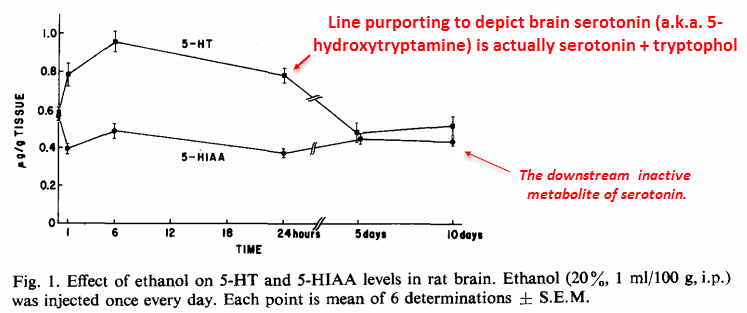
For instance, the largest increase of brain serotonin (56%) was reported by Bonnycastle, a medical doctor from Yale.
Bonnycastle used the quick extraction procedure developed by Mead & Finger.
This procedure was a modification of one intended to extract both serotonin and catecholamines together in one step…
This saved time and required less specialized equipment.
“A combined extraction method (MEAD and FINGER, 1961) permits the assay of both amines in one sample, but suffers a loss in sensitivity.” –Maikel
But this method also extracts 5-hydroxytryptophan and tryptophol, among others, with no attempt made to resolve them afterwards.
And these all show up together when detected using UV light.
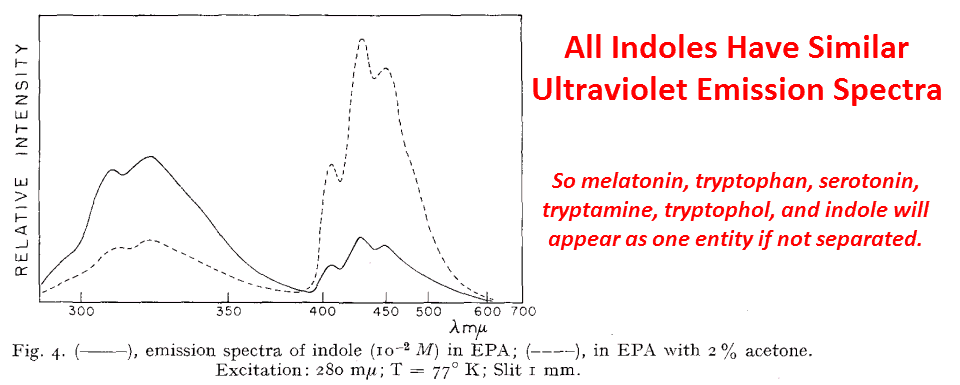
Mead & Finger themselves admit that 5-hydroxytryptophan is also extracted by their procedure.
But, since this exists at very low concentrations, it can be neglected.
But tryptophol cannot be neglected.
And, at the time, scientists didn’t yet know that this occurs in the brain…
And they certainly didn’t know that ethanol predictably increases its concentration.
“It was reasonable then to assume that ethanol in man decreased 5-HIAA due to acceleration of the alternate pathway leading to 5-hydroxytryptophol and its conjugates.” –Feldstein
The better biochemists of the day all demonstrated a decrease in brain serotonin.
These people used a proper basic pH to extract the serotonin.
They followed that by a re-acidification to get it back into the water phase (separating out the tryptophol).
With the 1970s came the far more advanced high-pressure liquid chromatography technique.
This process actually physically separates each indole using a fine porous column.

This leaves no ambiguity…
And studies using this method all show a decrease in total brain serotonin after ethanol ingestion.
If high-pressure liquid chromatography is the Cadillac of separation techniques, the Mead & Finger extraction method would be the Honda Accord.
This is consistent.
And should a person speak of “paradoxical effects” of ethanol and serotonin, you can probably take that as evidence of ignorance.
But there are a few more details to consider.
For example, free serotonin always increases.
This most likely occurs because ethanol displaces it from binding sites (Palaić, 1971).
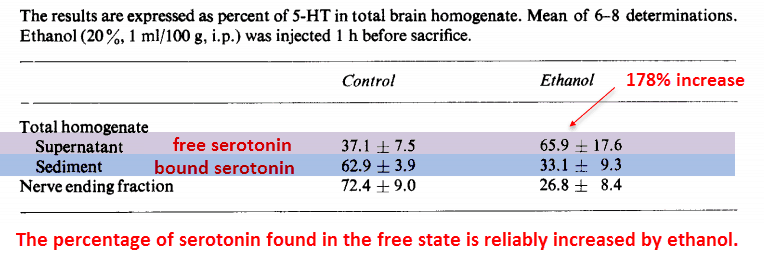
But the total amount always decreases because cerebrospinal fluid flushes away the released serotonin.
More importantly, the sleep-promoting tryptophol – which is more bioactive than serotonin in many respects – increases.
[cmamad id=”27171″ align=”center” tabid=”display-desktop” mobid=”display-desktop” stg=””]
This is because the same enzymes that metabolize ethanol also metabolize tryptophol…
After all, they are both alcohols.
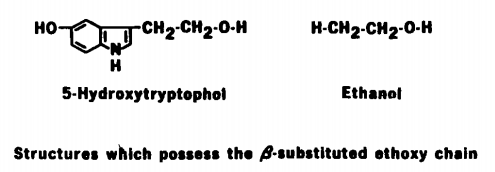
Tryptophol is like an indole with an ethanol attached. Sometimes it is even written as indole-3-ethanol (Seed, 1978).
While the initial serotonin release can explain the feeling delivered by the first few drinks, it takes tryptophol to convincingly explain the drunken and comatose states.
This is because it’s the only tryptophan metabolite that can produce sleep when given directly.
No other indole besides tryptophol and its derivatives can do this (Seed, 1978).
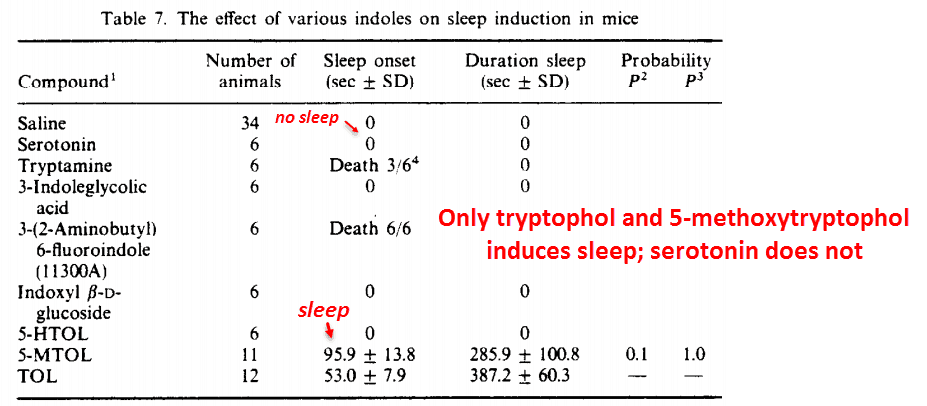
Tryptophol also explains how tryptophan will lead to drowsiness even though serotonin will not.
The molecule tryptophol is the missing link… It explains ethanol’s effects and makes assumed “paradoxical results” seem perfectly straight forward.
But most scientists still fixate myopically on serotonin – just serotonin and even more serotonin.
It is tryptophol, not serotonin, that causes the reduced glucose metabolism in the brain (Cornford, 1981):

Both serotonin and tryptophol levels return to baseline a few hours after drinking…
So you don’t have to worry about a chronically imbalanced mind state from occasional drinking.
Here’s what alcohol causes:
(1) An increase in tryptophol
(2) A serotonin shift from the bound to the free state
(3) A slight reduction in total serotonin levels afterwards
“Ethanol in vivo in rats markedly decreased the conversion of serotonin-C¹⁴ to 5-hydroxyindoleacetic acid-C¹⁴ from 84% to 47% in liver homogenates with a concomitant increase in the formation of 5-hydroxytryptophol from 13% to 51%.” –Feldstein
But many foods will actually increase total brain serotonin concentrations by increasing the blood tryptophan ratio.
Tryptophan in the bloodstream is where all brain serotonin comes from.
The ratio of tryptophan vs its competing amino acids matters more to the process of brain uptake than total amount.
Among proteins, whey powder, soy protein isolate, and egg white do this the most powerfully.
And, perhaps surprisingly, even protein-free glucose or starch will do as much to modify brain serotonin as ethanol…
These foods all release insulin. And this hormone draws every amino acid out of the blood and into the cells.
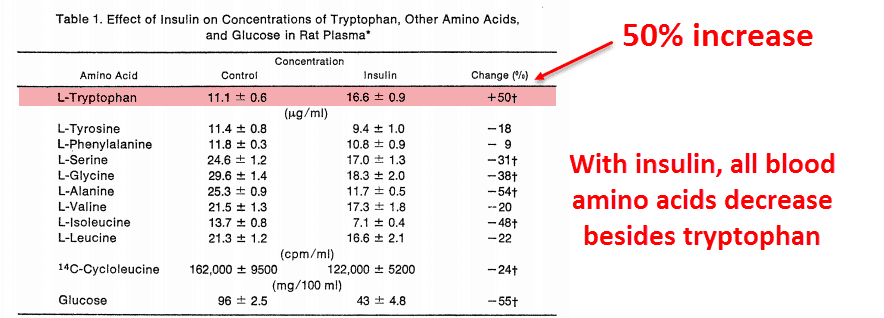
Well, every amino acid besides albumin-bound tryptophan, which remains in the blood.
The tryptophan-enriched blood has more available tryptophan for brain uptake and serotonin synthesis.
Some proteins will increase brain serotonin, but drinking soda will do so even more.
So you have to worry just as much about what you mix with your ethanol as about the ethanol itself.

A dry martini will produce tryptophol and transiently release free serotonin.
A Rum & Coke, for example, will do the same but will also increase the tryptophan available to the brain.
It’s easier to maintain composure while drinking dry alcohol.
—-Important Message—-
NEW 5-minute video shows men how to have Nirvana Sex

- Discover how to have sex for hours, feeling pleasure the entire time…
- Experience full-body waves of orgasmic bliss…
- Experience increased intimacy and desire…
- Make your connection with your wife or girlfriend SO much stronger…
- And much more…
Watch this mini video now and try Nirvana Sex tonight.
———-

- Feldstein, A. "Ethanol-induced sleep in relation to serotonin turnover and conversion to 5-hydroxyindole acetaldehyde, 5-hydroxytryptophol, and 5-hydroxyindoleacetic acid." Annals of the New York Academy of Sciences (1973)
http://onlinelibrary.wiley.com/doi/10.1111/j.1749-6632.1973.tb28250.x/full - Palaić, D. "Effect of ethanol on metabolism and subcellular distribution of serotonin in rat brain." Brain research (1971)
http://sciencedirect.com/science/article/pii/0006899371904458 - Mead, J. "A single extraction method for the determination of both norepinephrine and serotonin in brain." Biochemical pharmacology (1961)
http://linkinghub.elsevier.com/retrieve/pii/0006-2952(61)90069-7 - Feldstein, A. "The effect of ethanol ingestion on serotonin-C14 metabolism in man." Life sciences (1967)
http://sciencedirect.com/science/article/pii/002432056790361X - Seed, J. "The biological effects of tryptophol (indole-3-ethanol): hemolytic, biochemical and behavior modifying activity." Comparative Biochemistry and Physiology (1978)
https://www.sciencedirect.com/science/article/pii/0306449278900916 - Cornford, E. "Reduction in Brain Glucose Utilization Rate after Tryptophol (3‐Indole Ethanol) Treatment." Journal of neurochemistry (1981)
http://onlinelibrary.wiley.com/doi/10.1111/j.1471-4159.1981.tb00428.x/full - Fernstrom, J. "Elevation of plasma tryptophan by insulin in rat." Metabolism (1972)
http://wurtmanlab.mit.edu/static/pdf/175.pdf
- The Expanded Biology of Serotonin
https://www.ncbi.nlm.nih.gov/pmc/articles/PMC5864293/ - Serotonin Involvement in Physiological Function and Behavior
https://www.ncbi.nlm.nih.gov/books/NBK27940/
